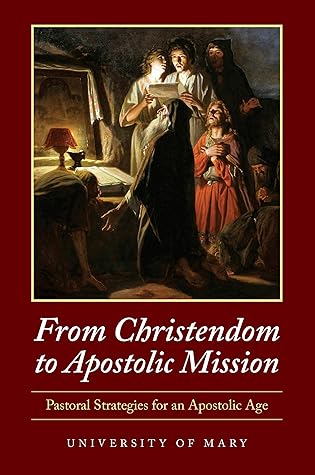More on this book
Community
Kindle Notes & Highlights
Read between
March 25 - April 2, 2023
“We are at the end of Christendom. Not of Christianity, not of the Church, but of Christendom. Now what is meant by Christendom? Christendom is economic, political, social life as inspired by Christian principles. That is ending — we’ve seen it die.” But he went on to say, “These are great and wonderful days in which to be alive. … It is not a gloomy picture — it is a picture of the Church in the midst of increasing opposition from the world. And therefore live your lives in the full consciousness of this hour of testing, and rally close to the heart of Christ.”
Much of what it means to be converted in mind is to receive and embrace the Christian imaginative vision of the cosmos: to see the whole of the world according to the revelation given in Christ, and to act upon that sight with consistency.
Precisely because of the high cost of discipleship, the great temptation in an apostolic age is not to hypocrisy but to cowardice.
Wherever apostolic zeal and apostolic strategies are in operation, the results are impressive: one sees conversions to the Faith, especially among the young; new movements and religious communities being born or rediscovering their vitality; institutions being founded or reformed; a deepening life of prayer and communal witness being expressed. These movements do not involve majorities, but that is part of the nature of an apostolic time: in a mission setting, the Church does not move by majorities.
They need to know, from their own experience, that obedience to the Gospel is perfect freedom, that holiness leads to happiness, that a world without God is a desolate wasteland, and that new life in Christ transforms darkness into light.
A healthy institution is always ordered to the human person and enhances, or at least does not diminish, the humanity of those under its influence.
a Christian institution in a non-Christian or anti-Christian cultural environment can only maintain its distinctively Christian character by energetic resistance to conformity with the wider atmosphere. Not to exercise such concerted activity is to lose the institution’s original purpose.
Raising a Christian family has always been a serious task; in an apostolic age, it is a missionary adventure.
such renewal in the Church always comes from (relatively) small numbers who are given the grace of an intensity of spiritual life for the sake of the whole body.
Jesus had a special love for James and John, the “sons of thunder,” even if he needed to rebuke them occasionally. And his choice for the apostle to the Gentiles was potentially a very difficult case. One wonders what Ananias and the others whose task it was to help Saint Paul into the local Church at Damascus shortly after his conversion must have felt. He was hardly the model seminarian too often posited by a sleepy and decaying Christendom — friendly, mild, and no trouble.
Sometimes it is better to have to tame the over-zealous than to try to convert the skeptical and inspire the apathetic.
Modern progressives are, as a group, remarkably impervious to genuine data.
Bringing the hope of a perfected human society into historical time has a great deal of potency. But it brings also a new relationship to the world. Because the world is seen to be perfectible, and because we are the ones who need to accomplish that perfection, the progressive vision has given rise to a great impatience with imperfection of all kinds.
Under the influence of a utopian vision of a society perfected by human energy, humble love for the poor was inevitably transposed into proud hatred for poverty; love for the sick became hatred for disease; love for the elderly turned into hatred for the ravages of age.
What then was to be done if there were too many poor people to be reasonably enriched, or too many people with sicknesses that had no cure, or too many elderly people who were debilitated by effects of old age that could not be reversed or mitigated? By a perverse but necessary logic, the solution has been to eradicate the poor, eliminate the diseased, and euthanize the aged. According to the modern narrative the point is radically to solve the problems of humanity; suffering is therefore offensive and embarrassing and not to be endured. Pride, rather than love, is the root motivation.
Having discounted the evil in each human heart and having little time for the idea of personal evil in fallen angelic beings, the progressive vision still needed to identify a source for the prevalence of active evil in the world. That source has always been found in a particular group of people who have been deemed to stand athwart the march of human progress.
Thus, the denial of the Fall inevitably brings with it a culture of death, not because its proponents set out to kill, but because the utopian ideal runs up against a fatally flawed humanity.
Americans like to be religious, but we also like to customize our religions to our personal preferences. We are not interested in religion as an account of reality; it is rather something that enhances our experience and helps us deal with the stress of existence. We are not so much seeking a Lord as looking for a therapist.
To become free under the Christian mythic vision was therefore to grow into a particular image, one given us by the God who had created us and according to which we would find happiness and goodness. Freedom was thus not an arbitrary concept, but rather a task with a goal. The accomplishment of freedom always demanded serious discipline according to what was good and true and right.


